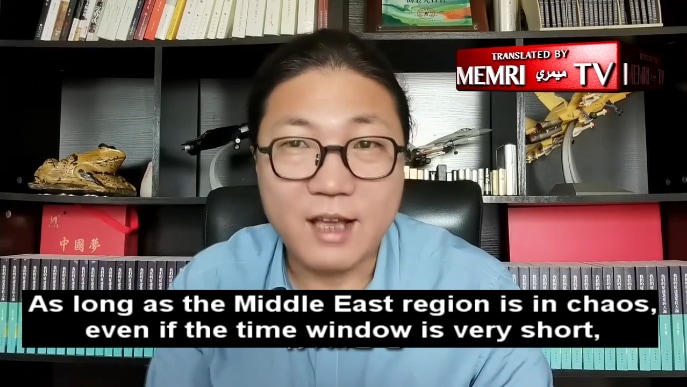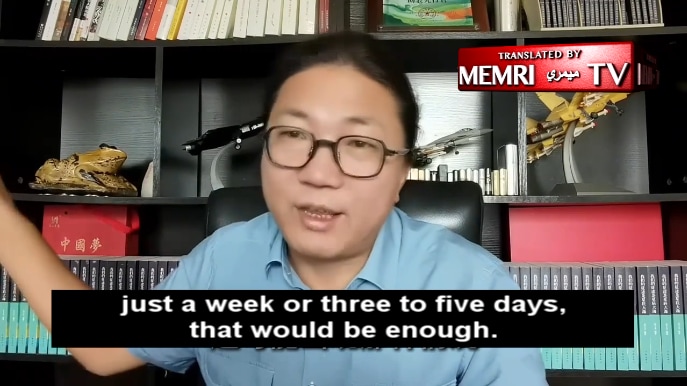
Prominent Chinese intellectual and social media influencer Hua Qianfang said in a video he posted to his Xigua Video account on August 4, 2024 that a major Hizbullah attack deep in Israeli territory might entangle the U.S. in enough "chaos" in the Middle East to grant China a "window of opportunity" to militarily achieve "reunification" with Taiwan while the U.S. is distracted.
Hua Qianfang: "Hello everyone, I'm Hua Qianfang. I know that sometimes, as a writer, I tend to overthink things. Recently, the international situation has been quite unsettling. After the Palestinian political leader [Ismail] Haniyeh was killed in an explosion, the situation in the Middle East has rapidly deteriorated. Let's first briefly review the news, and then we'll comment on it. There are three short paragraphs.
"The first paragraph states that, according to a report from Agence France-Presse in Tehran on August 3rd, Iran indicated that its ally Hizbullah would intensify deep strikes against Israel, not limiting them to military targets, in response to the July 30 assassination of Hizbullah [military] chief [Fuad] Shukr near Beirut. Here's the thing: if Iran is making such a statement, it proves that this is Iran's intention.
"I think Iran's plan is actually very correct. Among Iran's many allies, Hizbullah in Lebanon is the most capable fighting force. Having them engage directly with Israeli soldiers on the front lines allows for a situation where both sides can attack and defend. Moreover, if it's not a large-scale conflict, it's uncertain who would win or lose. Israel's plan to dominate the entire Middle East was halted because they suffered significant losses against Hizbullah, realizing their strength wasn't sufficient, so they retreated and focused on development for a long time. This means that until now, Israel also feels that it has accumulated enough strength.
"Another key reason is that the United States has also declined considerably, right? Before the U.S. completely falls, Israel needs to create greater benefits for itself, which is actually a very risky move. The issue is that this is just Hizbullah's retaliatory measure, which is different from Iran's retaliatory measures. Although Iran and Israel are separated by Jordan and Iraq and are not directly adjacent, Iran's stockpile of surface-to-air missiles is still quite impressive. Especially yesterday, a Russian heavy military transport plane happened to take off from Russia and landed in Tehran, Iran's capital. What exactly was delivered by this plane? Was it radar or missiles? These are things that need to be guarded against and considered.
"This actually tells us quite clearly that in this round of counterattacks from the Arab world, Iran's various allies are likely to serve as the front-line strike force, while Iran itself will provide long-range fire support from the rear. That's roughly the situation. Once this scenario unfolds, it might be somewhat easier to explain for Israel, but it becomes more difficult for the United States to justify. After all, Israel has been living in this region for many years, and many countries recognize Israel, including our country, right? So to say that at this stage you want to turn Israel into a sieve in one go and drive all the Jewish people out of this region directly – that's a bit premature.
"This means that Iran's counterattack this time should also be a limited one. However, the posture they're displaying doesn't look like that of a limited counterattack. For Israel, this may not mean national destruction or ethnic extinction, but for the United States, it's becoming a bit difficult to explain. Why? Because Israel is their little brother, and if your little brother gets beaten up like this, you know, if the big brother doesn't step in, it just doesn't make sense, or there's no way to account for it to the numerous allies.
"This essentially means that the likely subsequent development is, after this round of attacks by Iran and its allies, Israel will be hit quite badly. Then the United States will probably step in to help. This is probably an issue where the U.S. will have to help whether it wants to or not. After all, it's currently the U.S. election period, and the Democratic Party is in power. During this time, if the U.S. were to get involved in a small scale war, it would be extremely beneficial for the Democratic Party's election prospects. And if the situation reaches this point, I think we can consider another matter, which is whether [my] hair should be cut short.
"After all, we agreed that as long as the motherland is not unified, we won't get a haircut. However, if the U.S. gets involved in the Middle East war in the short term at this stage, their ability to control other regions of the world would be very limited. It's not non-existent, it's still there, but very limited. After all, they're still tied up with the Russia-Ukraine conflict. As long as the Middle East region is in chaos, even if the time window is very short, just a week or three to five days, that would be enough. You understand what I mean, right?


"Of course, we must say that such matters, similar to national wars, are decided by the country. If the country thinks the opportunity is good, it will take action, and we will support it vigorously. If the country thinks the opportunity isn't good, and we should wait a bit longer, that's fine, we'll wait a bit longer. Even if I grow my hair this long, it's not like it will weigh my head off. As long as the country can afford to wait, I can wait too."












